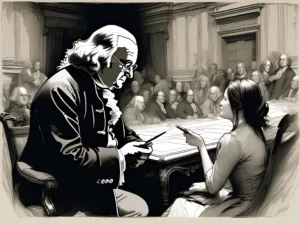How the 2024 Election Paves the Way for an Authoritarian Shift
A Republic If you can Keep It was the response Benjamin Franklin gave a woman who asked him what kind of government are you giving us. His prophetic words may well be appropriate for the 2024 election results signaling a possible turning point for American democracy. The Republican Party’s sweeping victory, fueled by strong ideological commitments and strategic campaigning, places it in a position to reshape the nation. For many,

Benjamin Franklin’s prophetic words, “A Republic, if you can keep it,” resonate now as a dire warning. As Republicans consolidate power, Democrats face the reality of a devastating loss. The factors behind this loss—declining male Democratic support, distrust in leadership, and polarization—compounded by the planned Republican agenda, raise troubling questions about the future of the democratic republic.
A Republic, If You Can Keep It: The Agenda to Consolidate Power
Additional Consideration: To fully appreciate the impact of a centralized executive agenda, consider how proposed policies might shift executive powers beyond traditional checks and balances. This trend builds on moves made by prior administrations but, under Project 2025, could limit Congress’s role in oversight. Potential scenarios include granting federal agencies the power to bypass existing judicial review processes or enacting directives that eliminate procedural norms in immigration, education, and health.
Decline in Democratic Male Voting Patterns: The 2024 election saw an unexpected decline in Democratic support among male voters, marking a shift that many attribute, at least in part, to Vice President Kamala Harris’s role on the ticket. While some voters may have perceived her gender as a factor in their decision, broader issues, such as economic concerns and the perception of the Democratic Party’s focus on identity politics, likely played a significant role. For these voters, the focus on social issues may have come at the expense of prioritizing economic stability, jobs, and healthcare—issues they viewed as more immediate to their lives.
A Republic, If You Can Keep It: Threats to Social Security, Medicare, and Medicaid
Additional Consideration: The proposed changes to social safety nets go beyond financial restructuring—they threaten to fundamentally alter the American social fabric. Social Security, Medicare, and Medicaid serve as guarantees of dignity and security for millions, especially seniors. If privatization moves forward, there are likely to be significant effects not just on individuals but also on broader family structures, as families may find themselves financially supporting older relatives with little to no government assistance.
Decline in Democratic Male Voting Patterns: Many men in economically vulnerable positions may have interpreted the Democratic Party’s focus on social justice initiatives as overlooking their financial challenges. This sentiment, tied to economic anxiety, may have driven them to support the Republicans, who, through targeted messaging, promised economic empowerment and deregulation, though this ultimately risks jeopardizing the very programs that support their families.
A Republic If You Can Keep It: Rolling Back Reproductive Rights Nationwide
Additional Consideration: The prospect of a nationwide abortion ban reflects a deeper push to standardize policies along ideological lines. Such moves are likely to extend to other state-regulated areas, further eroding federalism and the autonomy of state legislatures to serve their unique populations. Potential consequences of this approach include further restrictions on reproductive health services, even in states that have robust protections.
Decline in Democratic Male Voting Patterns: The focus on reproductive rights as a key issue may have alienated some male voters who felt disconnected from the policy implications. Rather than viewing reproductive rights as a shared issue, they may have perceived the Democratic Party as increasingly focused on gender-specific concerns, which could explain their inclination toward a party perceived as more focused on individual economic freedom.
A Republic If You Can Keep It: The Assault on Free Expression and Press Freedom
Additional Consideration: A restricted press would not only limit transparency but also impact the global perception of America as a defender of free expression. Historically, America has served as a beacon of press freedom; dismantling these protections could have international implications, emboldening other nations to curtail press freedoms and civil liberties. Within the U.S., a controlled media landscape would likely lead to increased misinformation and public distrust in both government and media institutions.
Decline in Democratic Male Voting Patterns: Distrust in media institutions has grown across demographics, with many male voters doubting the veracity and impartiality of mainstream news outlets. Democrats’ alignment with certain media channels and platforms may have reinforced this perception, pushing some male voters toward a party that appeals to their skepticism of established media narratives.
A Republic If You Can Keep It: Limiting Voting Rights and Restricting Access
Additional Consideration: The erosion of voting rights could create a self-perpetuating cycle of disenfranchisement, where marginalized communities are increasingly excluded from the democratic process. This tactic, which reduces opposition voting strength, could eventually result in a government that no longer reflects the diverse population it governs. Without federal protections, state-level voting restrictions could create “democratic deserts” in which fair representation is nearly impossible.
Decline in Democratic Male Voting Patterns: Male voter disenfranchisement often occurs indirectly, as restrictions on early voting or mail-in ballots impact workers who cannot take time off to vote in person. Economic instability, a core issue for male voters, has exacerbated this problem. Many Democrats’ focus on certain social issues, rather than broadening access to voting through pragmatic policies, may have left these voters feeling overlooked.
A Republic If You Can Keep It: Erasing LGBTQ+ Protections and Civil Rights
Additional Consideration: The rollback of LGBTQ+ protections risks destabilizing social progress and eroding legal rights that ensure equal treatment. Without federal protections, discrimination in the workplace, healthcare, and housing could become normalized, pushing marginalized groups further into insecurity. In states with limited protections, LGBTQ+ individuals might face discrimination at every level, stripping them of the rights and freedoms foundational to American identity.
Decline in Democratic Male Voting Patterns: Some Democratic men may have perceived the party’s emphasis on LGBTQ+ rights as competing with or overshadowing other urgent issues, such as economic security and healthcare access. This misalignment may have contributed to their defection to the Republicans, who framed their message around issues perceived as more universally relatable, though this often came at the expense of civil liberties for marginalized groups.
Conclusion: A Republic If You Can Keep It—The Last Stand
Franklin’s warning that a democracy requires active maintenance could not be more apt in this moment. Democratic norms are unraveling, and without engaged citizens willing to resist these authoritarian shifts, the republic may be lost. Every segment of the new administration’s agenda risks fundamentally changing the rights and freedoms that Americans have fought for. The outcome of the 2024 election is more than a political shift—it’s a challenge to the very core of American identity.
If America is to remain a Republic, the fight to “keep it” must begin now.
—
Suggestions for Further Reading
- “How Democracies Die” by Steven Levitsky and Daniel Ziblatt – This book explores how democratic erosion has occurred historically, offering insights into authoritarian shifts.
- “On Tyranny: Twenty Lessons from the Twentieth Century” by Timothy Snyder – Snyder provides a blueprint on resisting authoritarianism, drawing on lessons from Europe’s slide into totalitarianism.
- “The Road to Unfreedom: Russia, Europe, America” by Timothy Snyder – Snyder examines how autocratic leaders manipulate democratic systems to consolidate power, a timely exploration of threats facing Western democracies.
- “Democracy in Chains: The Deep History of the Radical Right’s Stealth Plan for America” by Nancy MacLean – MacLean details the ideological groundwork that has emboldened today’s far-right strategies.
- “The Fifth Risk” by Michael Lewis – Lewis highlights the dangers of underfunding and politicizing federal agencies, which could have long-term impacts on democratic governance.
- “The People, No: A Brief History of Anti-Populism” by Thomas Frank – Frank explores the populist roots of American democracy, analyzing the risks posed by anti-populist, elite-driven policies.
- “Dark Money: The Hidden History of the Billionaires Behind the Rise of the Radical Right” by Jane Mayer – Mayer reveals the role of wealthy donors in shaping policy and influencing elections, shedding light on the forces that drive political agendas.
- “The New Jim Crow: Mass Incarceration in the Age of Colorblindness” by Michelle Alexander – Alexander’s seminal work on systemic inequality provides context for understanding the racial dimensions of voting restrictions and disenfranchisement.
Each of these works provides essential insights into the challenges facing American democracy, offering historical, analytical, and practical perspectives on preserving democratic values in the face of authoritarian threats.




